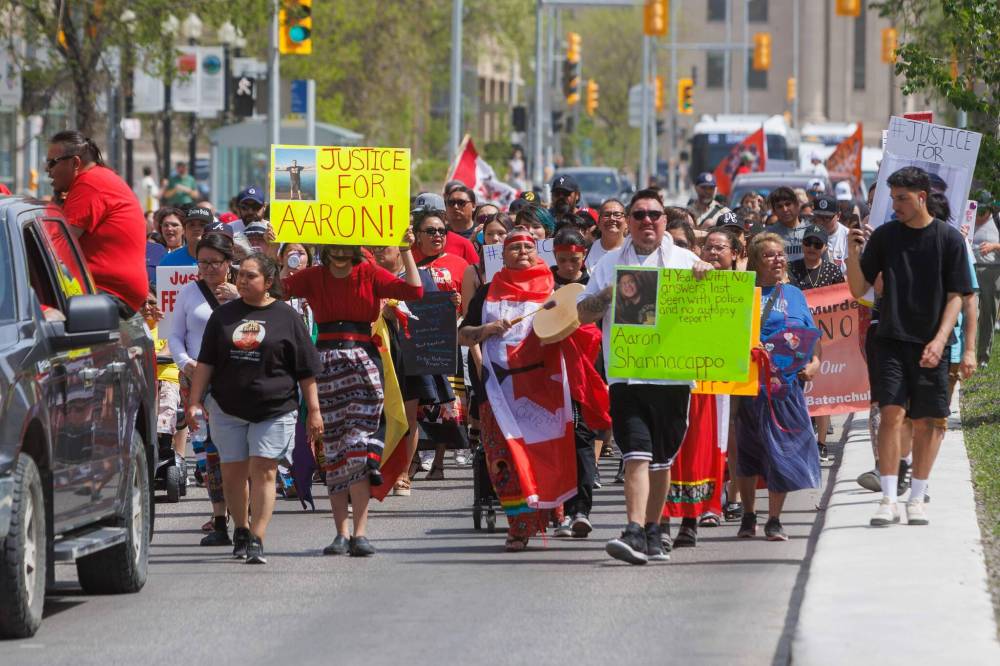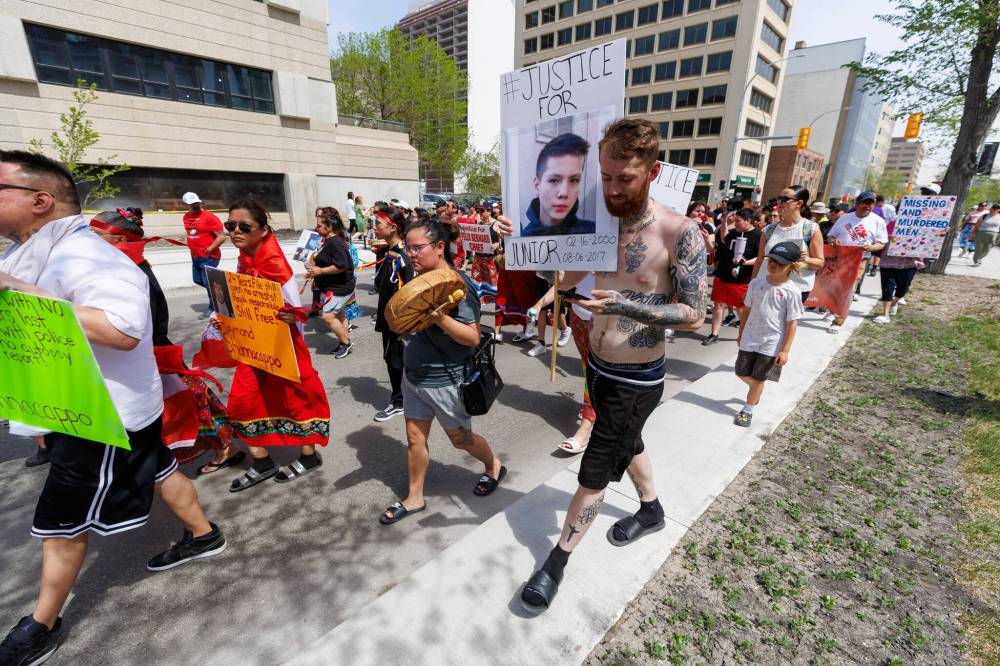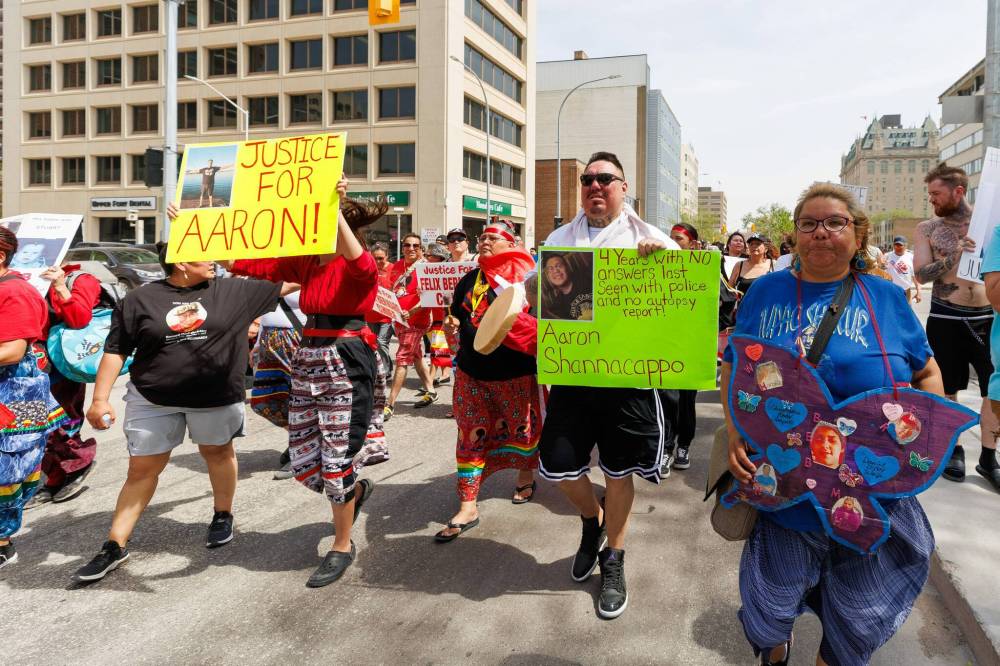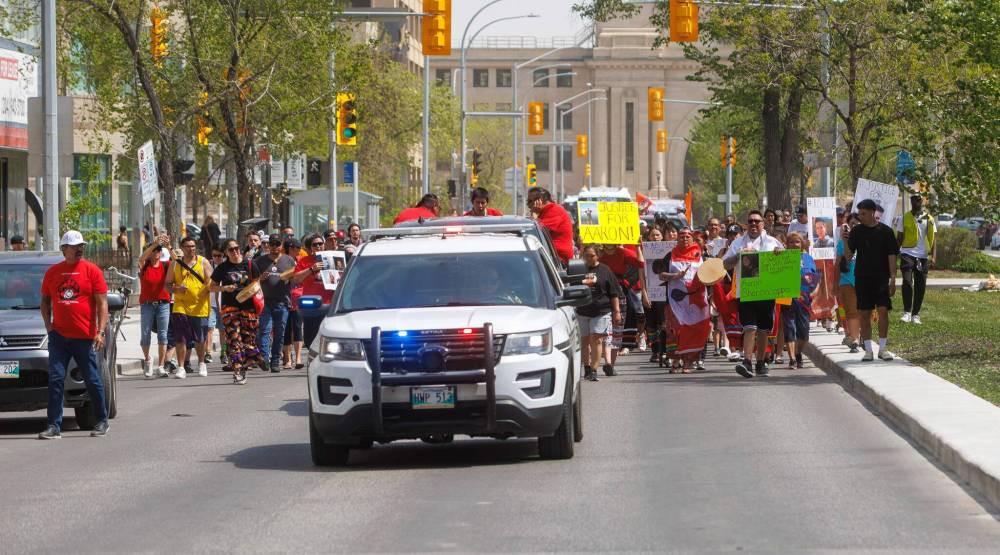Marchers demand attention on missing, murdered Indigenous males
Advertisement
Read this article for free:
or
Already have an account? Log in here »
To continue reading, please subscribe:
Monthly Digital Subscription
$0 for the first 4 weeks*
- Enjoy unlimited reading on winnipegfreepress.com
- Read the E-Edition, our digital replica newspaper
- Access News Break, our award-winning app
- Play interactive puzzles
*No charge for 4 weeks then price increases to the regular rate of $19.00 plus GST every four weeks. Offer available to new and qualified returning subscribers only. Cancel any time.
Monthly Digital Subscription
$4.75/week*
- Enjoy unlimited reading on winnipegfreepress.com
- Read the E-Edition, our digital replica newspaper
- Access News Break, our award-winning app
- Play interactive puzzles
*Billed as $19 plus GST every four weeks. Cancel any time.
To continue reading, please subscribe:
Add Free Press access to your Brandon Sun subscription for only an additional
$1 for the first 4 weeks*
*Your next subscription payment will increase by $1.00 and you will be charged $16.99 plus GST for four weeks. After four weeks, your payment will increase to $23.99 plus GST every four weeks.
Read unlimited articles for free today:
or
Already have an account? Log in here »
Hey there, time traveller!
This article was published 13/05/2025 (220 days ago), so information in it may no longer be current.
More than 100 people took to the streets seeking justice for missing and murdered Indigenous men and boys and more support for their loved ones Tuesday.
Participants — many of whom are mothers, daughters and sisters of missing and slain men — held photos of family members and friends.
They began the march at the Canadian Museum for Human Rights and ended on the steps of the legislative building, where water and food was handed out and speeches were held.

MIKE DEAL / FREE PRESS
Manitoba had the highest Indigenous homicide rate in 2024, as per Statistics Canada.
Organizer Corinne Chief, whose brother, Felix Bernard Chief, was killed in a violent assault in Winnipeg in 2021, wants to see the walk become an annual gathering and national day in honour of missing and murdered Indigenous men and boys.
“We need to come together and get those same supports and services, resources, that our missing and murdered Indigenous women, girls and two-spirit and gender-diverse (people) get… because their lives matter too,” Chief said.
Her brother’s killers were convicted — Chief describes them as Indigenous, under 30 years old, and victims of inter-generational trauma — but she said their sentences were short and one is already out on parole.
Chief said many of the people who came out Tuesday were similarly seeking closure they haven’t been able to find.
“I didn’t receive it,” she said. “I had the anger, the frustration.”
A 2024 Stats Canada report on Indigenous victims of homicide, which used 2022 data, found that Indigenous people accounted for 27 per cent of homicides where identity information was available.
Men outnumber women, unless the victim was considered a missing person at the time of their death. Two-thirds of Indigenous homicide victims who were considered missing at the time of death were women.

MIKE DEAL / FREE PRESS
Participants, many of whom are mothers, daughters and sisters of missing and slain men, marched from the Canadian Museum of Human Rights to the legislative building.
At the time of the report, Manitoba had the highest Indigenous homicide rate per 100,000 people in the country.
Glennis Bird, a member of Peguis First Nation, told the crowd her family faced cruelty and indifference by the justice system when her brother, John Andrew Bird, went missing in 1998.
“(Police) said, ‘You know, he’ll come home when he’s done partying, when he sobers up.’ I was so upset, my mom had to calm me down, because that wasn’t our family, that wasn’t our truth… So we did what so many Indigenous families are forced to do — we became the search party,” she said.
Her brother, whom she described as laid-back and adventurous, was found dead in the Red River in March 1999. She wants men and boys to be a greater part of the conversation about violence against Indigenous people.
“He was someone special, and he is someone worth remembering, like all the other brothers, sons, uncle, cousins and grandsons. We must say their names too,” she said.
“We must honour them when we speak of the missing and murdered Indigenous peoples across Canada.”
Marches focusing on men, boys and gender-diverse people have grown quickly in recent years across Canada. In 2023, Edmonton advocates created “Blue Jean Jacket Day,” an annual event focused on honouring Indigenous men and boys.

MIKE DEAL / FREE PRESS
Some advocates are calling for an annual day of recognition for the families of missing and murdered Indigenous men and boys.
On Wednesday, the wife of a man who was slain last year will hold an event of her own.
Taylor Kowalenko-Caribou, whose fiancé Leo Caribou died in hospital after he was found unresponsive from an apparent assault near Notre Dame Avenue and Isabel Street on May 14, 2024, plans to hold a vigil at the site to mark the one-year anniversary of his death.
“It’s hard to grieve and get closure when you don’t even know what happened,” she said. “We live our lives every day, feeling his loss and going without him, when the people who did it are walking out there, living their best lives.”
Kowalenko-Caribou, 24, said she and Caribou’s family have yet to receive detailed updates on the Winnipeg Police Service homicide investigation since shortly after his death at age 23. No arrests have been made.
She attended the Tuesday march.
She said her vigil is to call for police to put more effort into solving her fiancé’s death, as well as other cases of missing and murdered Indigenous men and boys.
“I’m all about advocating not just for Leo, but all of the missing and murdered Indigenous men and boys that don’t receive as much attention as women and girls,” said Kowalenko-Caribou.

MIKE DEAL / FREE PRESS
More than 100 people joined Tuesday’s march through downtown Winnipeg.
Police have provided no public update on the investigation into Caribou’s death since May 2024, but expect to issue a news release on the case Wednesday.
malak.abas@freepress.mb.ca
erik.pindera@freepress.mb.ca

Malak Abas is a city reporter at the Free Press. Born and raised in Winnipeg's North End, she led the campus paper at the University of Manitoba before joining the Free Press in 2020.

Erik Pindera is a reporter for the Free Press, mostly focusing on crime and justice.
Our newsroom depends on a growing audience of readers to power our journalism. If you are not a paid reader, please consider becoming a subscriber.
Our newsroom depends on its audience of readers to power our journalism. Thank you for your support.

